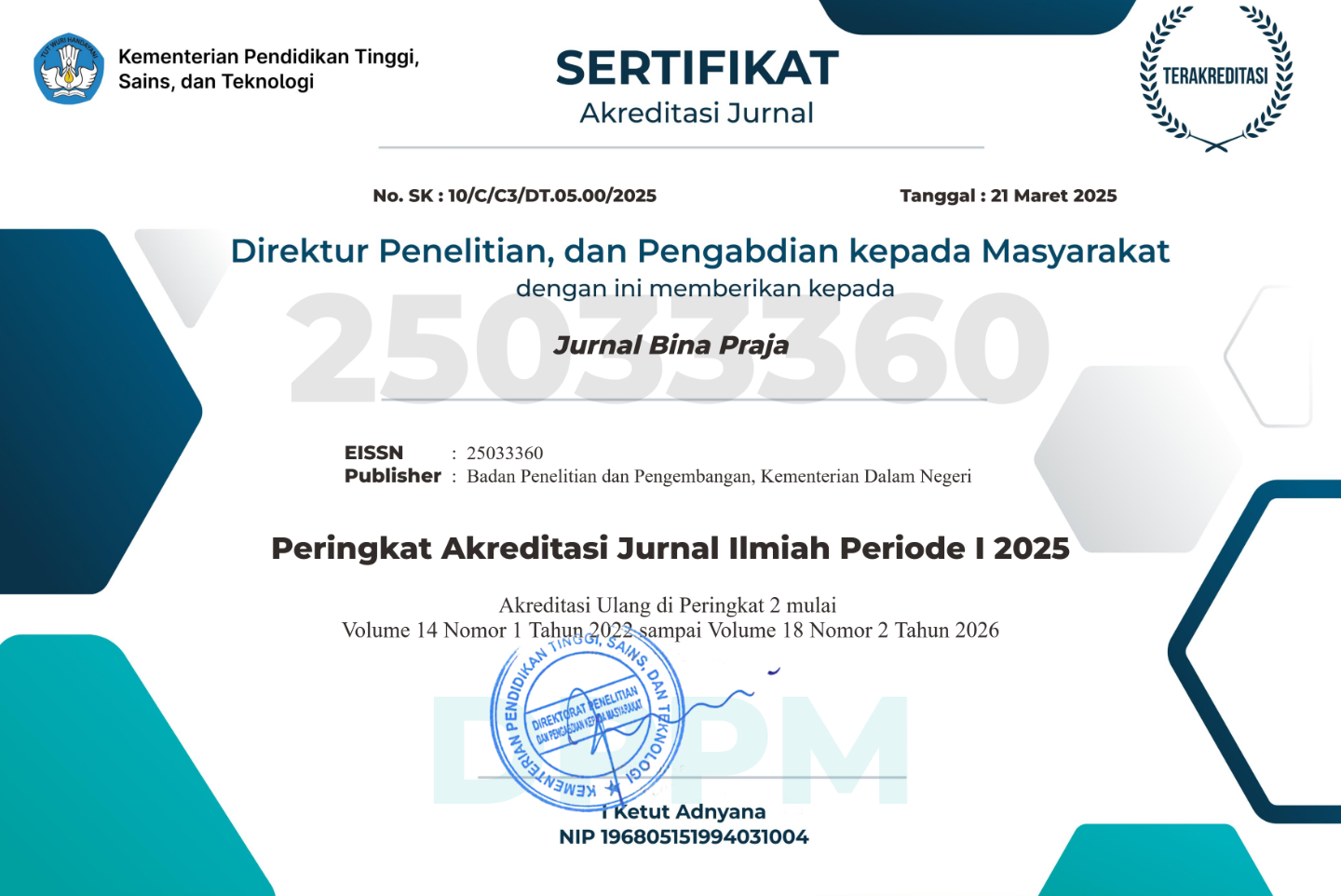Raising Local Fiscal Autonomy in the Local Autonomy Management
A Study in Bogor Regency
DOI:
https://doi.org/10.21787/jbp.12.2020.53-63Keywords:
Local Fiscal Autonomy, Fiscal Decentralization Implementation, Indirect Local Tax ManagementAbstract
Local fiscal autonomy of Bogor Regency is still low, due to the low contribution of local own revenue to total local revenues. This fact has implications for the high local financial dependence on fiscal transfer from the central government, so that the Bogor Regency government is not yet autonomous in financing local development programs. This research aims to obtain rational knowledge about the effects of fiscal decentralization implementation and indirect local tax management on local fiscal autonomy. The research used a descriptive method with a qualitative approach, so that it can explain data and information obtained from observation, interview, and focus group discussion. The research concludes that the prospect of raising local fiscal autonomy is determined by the accuracy of fiscal decentralization implementation and the effectiveness of indirect local tax management. The accuracy of fiscal decentralization implementation requires the central government policy in the assignment of taxes and revenue sources to local government must be commensurate with the assignment of expenditure responsibilities to local government. The effectiveness of indirect local tax management requires that local government efforts to increase indirect local tax revenues must precisely determine the increase of revenue targets according to the results of econometric analysis of Gross Domestic Regional Product (GDRP) on certain sectors, improving the ability of local tax apparatus, and improving the obedience of indirect local taxpayer.
Downloads
References
Ahmad, J. K. (1999). South Africa: an intergovernmental fiscal system in transition. In R. M. Bird & F. Vaillancourt (Eds.), Fiscal Decentralization in Developing Countries (pp. 239–270). Cambridge University Press. https://doi.org/10.1017/CBO9780511559815.009
Bărbuţă-Mişu, N. (2011). A Review of Factors for Tax Compliance. Economics and Applied Informatics, 17(1), 69–76. http://www.eia.feaa.ugal.ro/images/eia/2011-1/Nicoleta_BarbutaMisu.pdf
Beer-Tóth, K. (2009). Local Financial Autonomy in Theory and Practice: The Impact of Fiscal Decentralisation in Hungary [University of Fribourg Switzerland]. https://doc.rero.ch/record/12729/files/Beer-TothK.pdf
BPKAD Kabupaten Bogor. (2016). APBD Kabupaten Bogor Tahun 2016.
BPKAD Kabupaten Bogor. (2017). APBD Kabupaten Bogor Tahun 2017.
BPS Kabupaten Bogor. (2017). Bogor Regency In Figures.
Dafflon, B. (2007). Fiscal Capacity Equalization in Horizontal Fiscal Equalization Programs. In R. Boadway & A. Shah (Eds.), Intergovernmental Fiscal Transfers: Pinciples and Practice (pp. 361–396). The World Bank.
Fjeldstad, O.-H., & Heggstad, K. (2012). Local Government Revenue Mobilisation in Anglophone Africa. SSRN Electronic Journal, 6, 1-34. Bergen, Norway: Michelsen Institute. https://doi.org/10.2139/ssrn.2408608
Government of Australia. (2008). Assessing Local Government Revenue Raising Capacity (Productivity Commission Research Report). https://ssrn.com/abstract=1159623
Law of the Republic of Indonesia No. 28 of 2009 on Local Taxes and Local Levies, Pub. L. No. 28 (2009).
Law of the Republic of Indonesia No. 23 of 2014 on Local Government, Pub. L. No. 23 (2014).
Jaweng, R. E. (2010). Memperkuat Otonomi Fiskal Daerah. Analisis CSIS, 39(4), 513–533.
Kountur, R. (2004). Metode Penelitian. CV. Teruna Grafica.
Le, T. M., Moreno-Dodson, B., & Bayraktar, N. (2012). Tax Capacity and Tax Effort: Extended Cross-Country Analysis from 1994 to 2009 (No. 6252). The World Bank. https://doi.org/10.1596/1813-9450-6252
Lerche, D. (1980). Efficiency of Taxation in Indonesia. Bulletin of Indonesian Economic Studies, 16(1), 34–51. https://doi.org/10.1080/00074918012331333689
Mahuni, F. J. R. (2008). The Efficiency of a Fiscally Decentralized Government in The Provision of Social Services: The Case of The Eastern Cape Provincial Government in South Africa. University of Fort Hare.
Malixi, C. (2008). Review and Assessment of Decentralization in the Philippines Focusing on Local Resource Mobilization (1991-2001). University of Freiburg.
Martinez-Vazquez, J. (2011). The Impact of Fiscal Decentralization: Issues in Theory and Challenges in Practice. Metro Manila, Philippines: Asian Development Bank. http://hdl.handle.net/11540/966
Ministry of Finance. (2013). Deskripsi dan Analisis APBD 2013.
Ministry of Finance. (2014). Deskripsi dan Analisis APBD 2014.
Ministry of Home Affairs. (2016). Profil APBD Provinsi dan Kabupaten/Kota Seluruh Indonesia Tahun 2014 dan Tahun 2015.
Poesoro, A. A. L. (2015). Fiscal Decentralization and Sub-national Taxes: Specific Case of Indonesia (No. 1015; Tax Law Design and Policy Series). https://ddtc.co.id/research/publications/working-paper/fiscal-decentralization-and-sub-national-taxes-specific-case-of-indonesia/
Prichard, W. (2010). Taxation and State Building: Towards a Governance Focused Tax Reform Agenda. IDS Working Papers, 2010(341), 01–55. https://doi.org/10.1111/j.2040-0209.2010.00341_2.x
Rodden, J., Eskeland, G. S., & Litvack, J. (2003). Fiscal Decentralization and the Challenge of Hard Budget Constraints (J. A. Rodden, G. S. Eskeland, & J. Litvack (Eds.)). The MIT Press. https://doi.org/10.7551/mitpress/3021.001.0001
Schneider, A. (2003). Who Gets What from Whom? The Impact of Decentralisation on Tax Capacity and Pro-Poor Policy (No. 179; IDS Working Papers). https://opendocs.ids.ac.uk/opendocs/handle/20.500.12413/3970
Shah, A. (1994). The reform of intergovernmental fiscal relations in developing and emerging market economies. The World Bank. https://doi.org/10.1596/0-8213-2836-0
Slack, E. (2017). How Much Local Fiscal Autonomy Do Cities Have? A Comparison of Eight Cities around the World. In IMFG Perspectives. IMFG, Munk School of Global Affairs, University of Toronto.
Smith, H. J. M. (2012). Fiscal Decentralization and Development: An Analysis of City Governments in Argentina and Mexico, 1980–2010 [Florida International University]. In FIU Electronic Theses and Dissertation. https://digitalcommons.fiu.edu/etd/613
Sukirno, S. (1981). Pengantar Teori Ekonomi Makro. Fakultas Ekonomi Univeritas Indonesia.
Surbakti, R. (2013). Berbagai Aspek Kebijakan Otonomi Daerah. Jurnal Ilmu Pemerintahan, 43, 1–35.
Suwandi, M. (2002). Konsepsi Dasar Otonomi Daerah Indonesia.
Treisman, D. (2007). The Architecture of Government: Rethinking Political Decentralization. Cambridge University Press.
Uchimura, H., & Suzuki, Y. (2009). Measuring Fiscal Decentralization in the Philippines (IDE Discussion Paper, Vol. 209). hdl.handle.net/2344/854
UNDP. (2005). Fiscal Decentralisation and Poverty Reduction. UNDP. https://www.undp.org/content/undp/en/home/librarypage/poverty-reduction/fiscal-decentralization-and-poverty-reduction.html
Vallés, J., & Zárate, A. (2012). Fiscal devolution and green tax administration. Urban Public Economics Review, 16, 60–92. https://www.redalyc.org/articulo.oa?id=50424589003
Vo, D. H. (2008). The Economics of Measuring Fiscal Decentralisation. Part II: New Fiscal Decentralisation Indices (No. 08–14; Economics Discussion/Working Papers). https://www.celt.uwa.edu.au/__data/assets/pdf_file/0010/94267/08_14_Vo.pdf
















